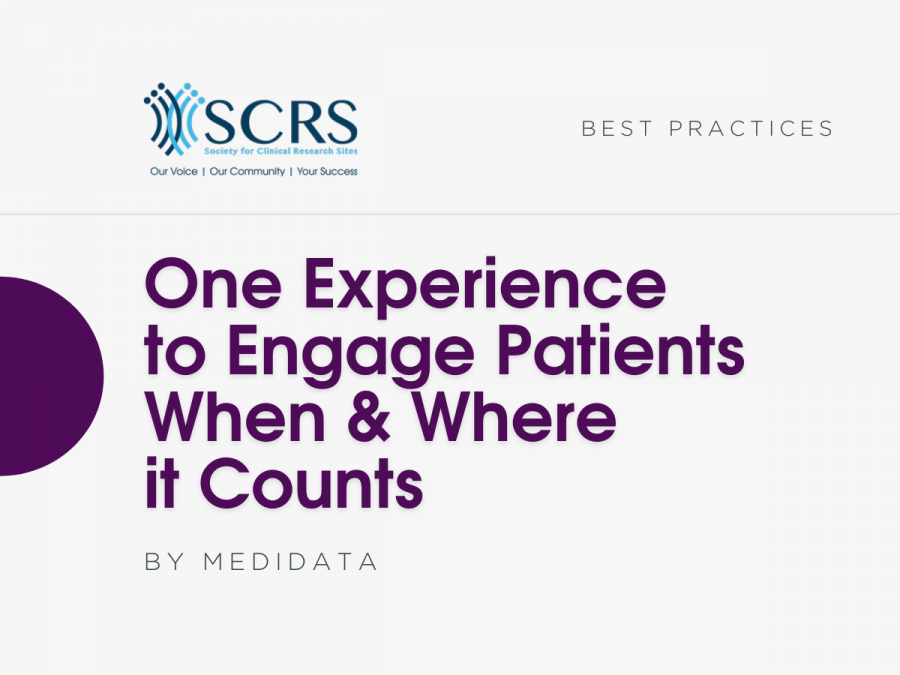One Experience to Engage Patients When and Where it Counts

By Kelly McKee, VP Patient Recruitment and Registries, Medidata
New medicines and vaccines are made possible through the participation of clinical trial volunteers who provide data to sponsors and research teams as part of the drug approval process. Traditionally, sponsors and CROs have relied on clinical trial sites to ensure that participants have positive clinical trial experiences and have spent little time designing or optimizing experiences from the perspective of a patient.
If we are to make meaningful change in access, inclusion, and equity in clinical trials, the patient experience must improve. Historically, patient participation and engagement have been limited to study visits and entirely confined to site and patient interactions.
Technological innovations and the emergence of Decentralized Clinical Trials (DCTs) have brought some of these interactions from outside the study site and into patient’s homes through innovations such as electronic informed consent (e-Consent), electronic patient-reported outcomes (ePRO), diaries (eCOA), live video visits, and sensors. Too often, these technologies are implemented singularly, with little or no regard to the holistic experience needs of the patient.
Engaging Patients Pre-Trial
Not all patients are prepared to participate at FSR (First Site Ready). Clinical trial participants are people and making the informed decision to participate can be a complex and emotional process.
Patients need time to become educated on clinical trials, and to feel engaged and empowered to choose clinical trials as an option. By engaging patients early through pre-trial registries, sponsors and CROs can provide information to help patients make the right choice for the right trial at the right time. Additionally, patients can be asked to provide their preferences on trial experience via surveys and registry data capture to help design more patient-centered trials.
Engaging Patients Post-Trial
Clinical trial participation may end with LPLV (Last Patient Last Visit), but expecting that a patient doesn’t need to be engaged beyond their last visit is short-sighted. With the vast majority of patients (95%1) being willing to participate in another study, providing additional opportunities to patients just makes sense.
Historically, data provided by clinical trial participants has not been shared with these individuals or their healthcare teams when their participation has come to a close. In the 2017 Transcelerate survey, “What do Clinical Trial Participants Want?” a clear majority of respondents favored patient data return with 81%2 and 83%2 requesting data return during and after a trial, respectively. It is incumbent upon us to make it easy for sponsors to return data to patients and easy for patients to receive this data.
Why is a Unified Platform Experience Important?
As DCTs continue to gain popularity, the industry has been inundated with point solutions for each step of the clinical trial process. This has resulted in a disjointed and chaotic experience for sponsors, sites and patients having to use multiple systems and portals for a single study. A unified solution is needed to bridge the gaps between data and workflows so that patient data is entered only once and automatically drives downstream workflows such as randomization and dosing calculations.
Additionally, a single destination patient portal enables patients to engage in all of their clinical trial activities with one login. This unified experience not only gives patients continuous support in and out of a trial, but improves experiences and retention.
At Medidata, we believe that the right combination of tools, people, and processes can create better patient experiences while enabling sponsors and CROs to execute faster, smarter trials driven by high-quality data.
References:
- CISCRP. (2021). Perceptions and Insights Study: Participation Experience. https://www.ciscrp.org/. Retrieved April 1, 2022, from https://www.ciscrp.org/wp-content/uploads/2021/11/2021-PI-Participation-Experience-Report-04NOV2021-FINAL.pdf
- TransCelerate BioPharma Inc. (2017). What Do Patients Want? https://www.transceleratebiopharmainc.com/. Retrieved April 1, 2022, from https://transceleratebiopharmainc.com/wp-content/uploads/2017/11/What-do-Patients-Want-Visualization.pdf



